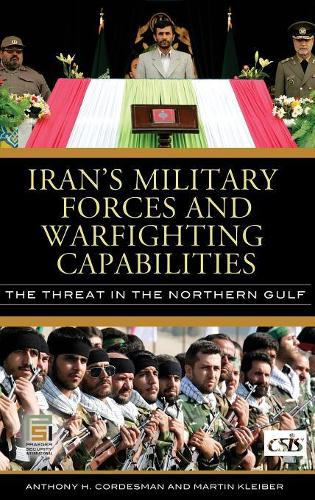
Iran's Military Forces and Warfighting Capabilities: The Threat in the Northern Gulf
(Hardback)
Publishing Details
Iran's Military Forces and Warfighting Capabilities: The Threat in the Northern Gulf
By (Author) Anthony H. Cordesman
By (author) Martin Kleiber
Bloomsbury Publishing PLC
Praeger Publishers Inc
30th September 2007
United States
Classifications
Tertiary Education
Non Fiction
355.00955
Physical Properties
Hardback
288
Description
Nations around the world are uncertain and anxious about Iran's intentions in the Middle East and the wider global arena. Its current president, Mahmoud Ahmadinejad, has made no secret of his opposition to Western society, particularly Israel, and his desire to acquire nuclear weapons. However, as Anthony H. Cordesman and Martin Kleiber point out, Ahmadinejad does not necessarily speak for the Iranian clerical regime, who operate in a cloud of secrecy and also directly control Iran's military. Given the ambiguous nature of Iran's global objectives, this new study focuses on the tangible aspects of Iran's military forces and takes an objective look at the realistic threats that Iran poses to the region and the world. The authors systematically assess each aspect of Iranian military forces from their conventional armies to their asymmetric threat via proxy wars in the region. Much attention in national security debates is paid to Iran's intentions without first understanding its capabilities. Lacking such a fundamental understanding, much of this speculation tends to be wasted and irrelevant to what could actually happen in the event of a conflict. Cordesman and Kleiber's study provides, in meticulous detail, a basis for understanding the realistic threat that Iran poses to the Northern Gulf.
Reviews
In this encyclopedic, informative book, Cordesman and Kleiber provide detailed data on Iran's current military capabilities and the structure of its armed forces, including the Revolutionary Guard Corps. They also describe Iran's missile capabilities and its evolving nuclear program. This is one of the most comprehensive books on mainstream American perspectives on Iran's military challenges to Persian Gulf stability, but it should be balanced by reading original Iranian sources that deal with existing and very real threats to the country's national security and territorial integrity. Summing Up: Recommended. Upper-division undergraduate, graduate, and research collections. * Choice *
Author Bio
Anthony H. Cordesman holds the Arleigh A. Burke Chair in Strategy at the Center for Strategic and International Studies and is an analyst and commentator for ABC News. He has written extensively on energy and Middle East politics, economics, demographics, and security. He has served in a number of senior positions in the U.S. government, including the Department of Energy, and several assignments in the Middle East. Martin Kleiber is a researcher at the Arleigh A. Burke Chair in Strategy at CSIS. He previously worked on security sector reform and nuclear non-proliferation at the German Foreign Office, in Bosnia, and at the United Nations. He has published on the nuclear non-proliferation regime and Iran as well as U.S. foreign and defense policy and he is the co-author of Chinese Military Modernization: Force Development and Security Capabilities together with Anthony H. Cordesman.
